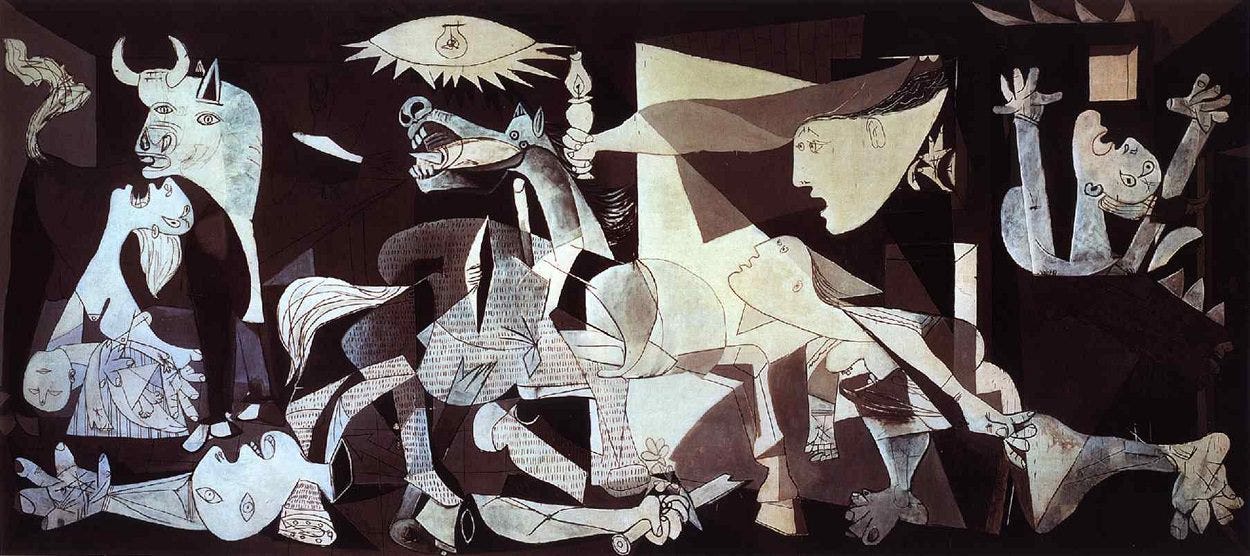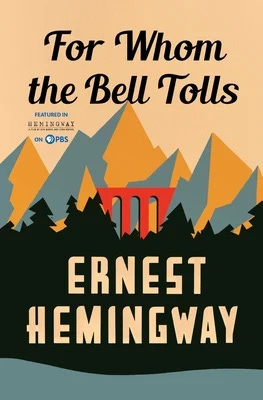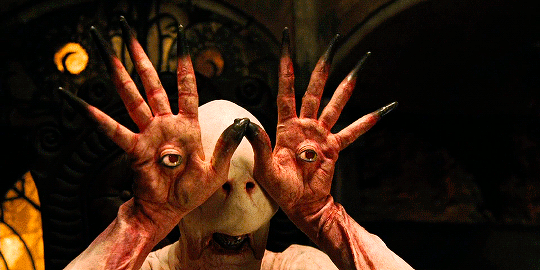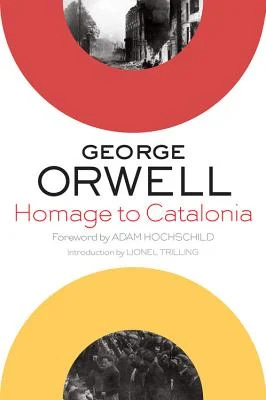Why the Spanish Civil War matters
Americans know very little about the Spanish Civil War, but it looms large over our culture.
This article was originally published on my personal website in slightly different form.
Ask the average American when fascism was defeated, and they will tell you 1945. Fascism, they say, died with Hitler and Mussolini. When did America start fighting fascism? December, 1941. Four years and we had the thing licked.
This is, of course, nonsense. Fascism continued to not only exist, but to be actively supported by the US government throughout the world as a bulwark against communism after the end of WWII1.
The war against fascism did not start with Hitler and Mussolini, though: the first stage was in Spain, where an amalgamation of liberals, communists, and anarchists fought against the forces of Francisco Franco. 3,000 Americans, known as the Abraham Lincoln Brigades, went to Spain starting in 1936 to fight Francisco Franco, the general who was attempting to overthrow Spain's democratically elected republic. They fought Franco — who had the fury of the German and Italian military behind him, as Hitler and Mussolini saw this as an ideal spot to test out their war machine — with zero support from the government of the United States, which had decided to stay neutral.
About a third of them died. Those who returned were considered heroes for a few brief years until the Red Scares of the 50's started up, and they were labeled as "premature antifascists." The man they were fighting went on to rule Spain until his death in 1975 — 30 years after the end of World War II.
While the Republicans (the broad name for the anti-fascist side in the war) eventually lost to Franco, the fight itself has left a massive impression on American culture. Some of the greatest works of art in the past century have been centered around or have referenced the war. Hemingway's For Whom the Bell Tolls, George Orwell's Homage to Catalonia (not to mention Animal Farm and Nineteen Eighty-Four), Picasso's Guernica, the 1942 classic Casablanca, the 2006 classic Pan's Labyrinth, and Carlos Ruiz Zafon's beautiful gothic novel The Shadow of the Wind, all revolve around "the good fight."
In a time of resurgent fascism — and when “antifascism” has again become a slur — it seems appropriate to look back at some of the great works that came from this honorable, doomed fight.
For Whom the Bell Tolls
Ernest Hemingway was a reporter in Spain during the Civil War. He was one of the last journalists to leave the country after the fall of the Republicans, and he used his experiences to write his masterpiece For Whom The Bell Tolls. The title comes from a meditation written by the English poet John Donne:
"No man is an Iland, intire of it selfe; every man is a peece of the Continent, a part of the maine; if a Clod bee washed away by the Sea, Europe is the lesse, as well as if a Promontorie were, as well as if a Mannor of thy friends or of thine owne were; any mans death diminishes me, because I am involved in Mankinde; And therefore never send to know for whom the bell tolls; It tolls for thee."
While in Spain, one of the people Hemingway met was Robert Hale Merriman, the young Californian leftist who commanded the Abraham Lincoln Battalion during the war. Hemingway was impressed with the young man, and likely based his principled, loner hero Robert Jordan off of him.
It's a very typical Hemingway book, which is to say there's a lot of machismo, a lot of short, declarative sentences about courage and bravery, and a lot of (let's call it what it is) dick-swinging.
But it is a great book. Hemingway's politics were a weird brand of testosterone-fueled leftism, but he came down firmly against fascism. There's a telling passage from the book where Jordan explains fascism in America to two Spanish guerrillas.
"But there are not great estates that must be broken up?"
"Yes. But there are those who believe that taxes will break them up."
"How?"
Robert Jordan, wiping out the stew bowl with bread, explained how the income tax and inheritance tax worked. "But the big estates remain. Also there are taxes on the land," he said.
"But surely the big proprietors and the rich will make a revolution against such taxes. Such taxes appear to me to be revolutionary. They will revolt against the government when they see that they are threatened, exactly as the fascists have done here," Primitivo said.
"It is possible."
"Then you will have to fight in your country as we fight here."
"Yes, we will have to fight."
"But are there not many fascists in your country?"
"There are many who do not know they are fascists but will find it out when the time comes."
"But you cannot destroy them until they rebel?"
"No," Robert Jordan said. "We cannot destroy them. But we can educate the people so that they will fear fascism and recognize it as it appears and combat it."

Interestingly, For Whom the Bell Tolls was not particularly loved by the actual Americans who fought for the Republicans during the war -- they did not think that Jordan's independent, lonely, all-American male was super representative of the actual men who fought in Spain. Most of them were working class. Most of them had minority or immigrant backgrounds. Most of them were believers in left-wing ideologies.
Casablanca and Pan’s Labyrinth
On their face, Casablanca and Pan's Labyrinth are not very similar movies. In Casablanca, this dude is the villain:
And in Pan's Labyrinth, this dude is the villain:
They are united, though, by a common thread: their heroes cut their teeth in the Spanish Civil War. Ofelia, the heroine of Pan's Labyrinth is young girl struggling to survive in a fascist military camp at the tail end of the war. And Rick Blaine, Humphrey Bogart’s hero in Casablanca is wanted by the Nazi's because he fought with the Abraham Lincoln Brigades.
Both stories also look directly into the eyes of nihilism and despair. It is hard, in retrospect, to not see Spain as a cautionary tale. Spain gives us a glimpse of what the world would've looked like if World War II had been lost. Franco's Spain was isolated for a decade or so after the end of World War II, but in the 50's, the United States had new enemies, and could no longer resist allying itself with anti-communist forces in mainland Europe. In part, this is why the fascists were able to stay in power for decades. When democracy was finally restored to Spain in the 70's, Franco's men were granted amnesty, and many continued to work in the government. The Basque and Catalonian separatist movements, still very much in the news today, got their start as leftist separatist movements during the Franco era.
Spain, then, is a country that we failed. And this hurt was still fresh in the early 40's: Casablanca's Rick is depicted, when we meet him, as a wounded idealist who has lost wars and the love of his life, and has sunk into a sort of self-centered nihilism.
Fighting nihilism by watching Casablanca a million times
Friday is Bastille Day, which is the day during the French Revolution when the common people stormed the notorious Bastille, a fortress, armory, and holding place for political prisoners. It’s now celebrated as France’s Independence Day, which, for my money, is at least part of the reason the French get what they want from their government so much more …
"I stick my neck out for nobody," he says. But as the other characters point out to him, this was not always the case:
Captain Renault:
In 1935, you ran guns to Ethiopia. In 1936, you fought in Spain, on the Loyalist side.Rick:
I got well paid for it on both occasions.Captain Renault:
The winning side would have paid you much better.
His nihilism, over the course of the movie, is revealed to be a façade that Rick adopted out of necessity after the heartbreak of losing so much. The movie itself, released in 1942, was something of a call to arms for Americans in the early days of the war, long before it was clear that the Allies would triumph. Many Americans had, until just recently, been broadly in support of the European fascists (their non-interventionist motto, "America First," has since been reused in the 45th American President's inauguration speech).
At the end (this is a spoiler, but honest to god, if you haven't seen Casablanca yet, what the fuck are you doing with your life?), Rick forgoes his own personal happiness in the cause of fighting back against the Nazis. Selfishness, in 1942, was a luxury the world could no longer afford.
Pan's Labyrinth is somehow even darker. Ofelia is the daughter of a fascist Captain's new wife. The Captain is tasked with rooting out and murdering the last surviving members of the Republican resistance. Ofelia's mother is pregnant and can't take care of her, so she's surrounded at all times by soldiers and truly horrific brutality. She also happens to be surrounded by some genuinely horrifying actual monsters, and finds that she has to overcome a set of fairy tale-like tasks to survive.
I don't want to spoil the movie (because it is literally the best movie I've ever seen and I still cry like a goddamn child every time I watch it), but it is through Ofelia, the weakest, most marginalized person on that military compound, that some form of hope is able to arise. It is perhaps best summed up by the modern writer Rebecca Solnit, in her book Hope in the Dark:
"The grounds for hope are in the shadows, in the people who are inventing the world while no one looks, who themselves don’t know yet whether they will have any effect, in the people you have not yet heard of who will be the next Cesar Chavez, the next Noam Chomsky, the next Cindy Sheehan, or become something you cannot yet imagine. In this epic struggle between light and dark, it’s the dark side — that of the anonymous, the unseen, the officially powerless, the visionaries and subversives in the shadows — that we must hope for."
Homage to Catalonia by George Orwell
George Orwell is best known for his books Animal Farm and Nineteen Eighty-Four. When I was in school, the books were taught as if they were cautionary tales about the dangers of communism. But in reality, Orwell himself was a socialist. In the late 30's, while working as a reporter, he decided to go to Spain to try and write a few articles about the Good Fight. When he got there, he changed his mind, and enlisted in the POUM, a communist sect within the Republican army.
During the fighting, Orwell was shot in the throat by a fascist sniper. "No one I met at this time," he wrote, "doctors, nurses, practicantes, or fellow-patients — failed to assure me that a man who is hit through the neck and survives it is the luckiest creature alive. I could not help thinking that it would be even luckier not to be hit at all." His throat injury meant he had to be moved back from the front to Barcelona.
In any war, there are uncomfortable unions. Groups of people in allied forces who do not particularly agree with each other, but whom are committed to fighting a common enemy. In Spain, the Republican side was a wildly diverse hodgepodge of leftist and liberal ideologies. There were the people who wanted to create autonomous democratic governments for their home regions (Basques, Catalonians, Galicians), there were democrats, there were anarchists, and there were communists. The communists alone had a handful of splinter groups: Stalinists, Trotskyists, democratic socialists, trade unions.
For the likes of Orwell, the splintering of ideologies seemed silly.
If you had asked me why I had joined the militia I should have answered: 'To fight against Fascism,' and if you had asked me what I was fighting for, I should have answered: "Common decency.' I had accepted the News Chronicle-New Statesman version of the war as the defence of civilization against a maniacal outbreak by an army of Colonel Blimps in the pay of Hitler. The revolutionary atmosphere of Barcelone had attracted me deeply, but I had made no attempt to understand it.
As for the kaleidoscope of political parties and trade unions, with their tiresome names -- P.S.U.C., P.O.U.M., F.A.I., C.N.T., U.G.T., J.C.I., J.S.U., A.I.T. -- they merely exasperated me. It looked at first sight as though Spain were suffering from a plague of initials. I knew that I was serving in something called the P.O.U.M. (I had only joined the P.O.U.M. militia rather than any other because I happened to arrive in Barcelona with [Independent Labour Party] papers), but I did not realize that there were serious differences between the political parties.
At Monte Pocero, when they pointed to the position on our left and said: 'Those are the Socialists' (meaning the P.S.U.C.), I was puzzled and said: 'Aren't we all Socialists?' I thought it idiotic that people fighting for their lives should have separate parties; my attitude always was, 'Why can't we drop all this political nonsense and get on with the war?'
The splintering would end up being the downfall of the resistance. Since the United States and other democratic countries didn't pitch in with the Republican efforts (with, incidentally, the exception of Mexico), most of the shots were called by the USSR under Joseph Stalin.
Over the course of the previous decade Stalin had been brutally consolidating power in the Soviet Union. His biggest rival -- a man who had escaped the USSR and continued to be a global figurehead, a man who Stalin was insanely jealous of -- was the revolutionary Leon Trotsky.
Stalin, in consolidating his power, had encouraged the idea in the USSR that there were subversive capitalist enemies everywhere, and that Trotsky was their ring-leader, that all of his revolutionary achievements were actually part of a sinister plot (it helped Stalin, no doubt, that Trotsky was Jewish, and people were already prone to believe this strain of anti-Semitic thoughts about Jews). His paranoid approach to politics did not, unfortunately, remain in the USSR. It spilled into Spain, where the Stalinists began to target the main Trotskyist sect: the POUM, where Orwell, so coincidentally, had found himself fighting.
To recover from the throat wound, Orwell returned to Barcelona right around the time that the Stalinists started accusing his militia of sedition. This meant Orwell was now an enemy of the people. He and his compatriots were accused of actually working with the fascists, and Orwell found that it was impossible to find any honest reporting back home in England on what was actually happening in Barcelona. "The Daily Mail," he wrote of the infamous right-wing shitrag, "amid the cheers of the Catholic clergy, was able to represent Franco as a patriot delivering his country from a horde of fiendish 'Reds.'" But the left wing papers were just as willing to lie. The New Statesman, Orwell mentions, "was treating us to tales of Fascist barricades made of the bodies of living children (a most unhandy thing to make barricades with)."
"One of the dreariest effects of this war," he wrote, "has been to teach me that the Left-wing press is every bit as spurious and dishonest as that of the Right." He'd noticed, while at the front lines, that he never seemed to be able to find the reporters who were writing about all of these atrocities. "Perhaps when the next great war comes" he said, "we may see that sight unprecedented in all history, a jingo with a bullet-hole in him."
This lack of commitment to truth meant that when Stalin turned his sights on all of the other left-wing militias, the mere concept of "truth" had been so diluted that it was impossible to reliably refute a false claim. The only newspaper that reliably told the truth in his home country, Orwell found, was The Manchester Guardian, which is still in print today at The Guardian. But how could everyone else know that? They hadn't been at the front. It was easier (and more comfortable) to just believe the conspiracies.
In a final, horrific act of self-destruction, the Stalinists attacked all of "disloyal" members of the coalition, and effectively destroyed any final chance of resistance against Franco and the fascists. Orwell himself fled the country. A year after the Civil War ended in 1939, Stalin signed the Nazi-Soviet non-aggression pact, effectively letting the Nazi's turn their eyes from Russia towards the rest of Europe.
Orwell maintained his leftism for the rest of his life (he actually says in Homage that he personally liked the anarchists more than the Trotskyists), but his later books were echoes of Catalonia, of what happens when lies are given the same value as truth, and what horrible hellscape awaits us when people, who all broadly have the same interests at heart, allow themselves to be divided.
Google “Operation Paperclip” and “Operation Gladio” for just a taste.








